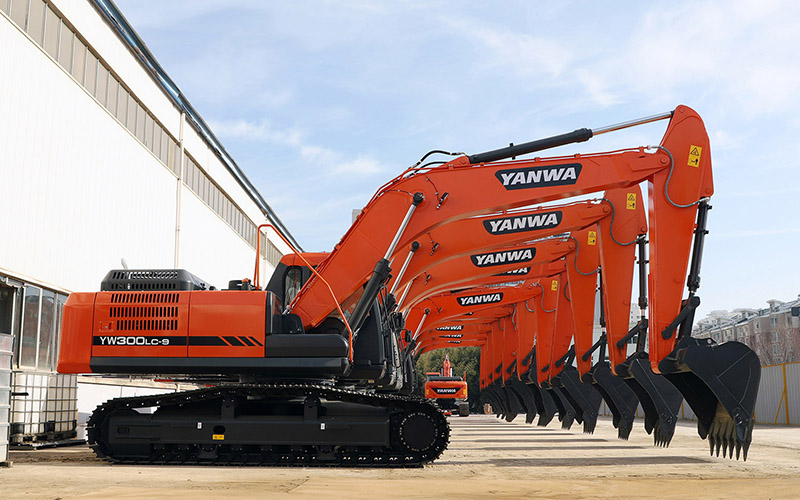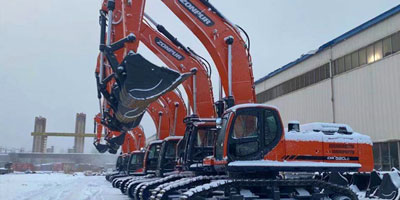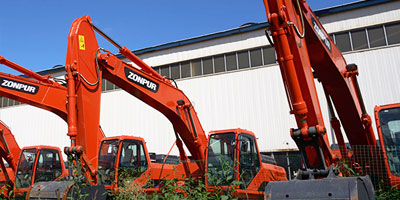Excavator overheating is a common yet serious issue that can lead to costly downtime, extensive repairs, and reduced equipment lifespan. Understanding the root causes of this problem is essential for operators and maintenance personnel to prevent catastrophic failures and maintain operational efficiency. This article examines the primary factors that contribute to excavator overheating, covering both engine and hydraulic system issues.
1. Cooling System Deficiencies
The cooling system is the excavator's first line of defense against overheating, and several components within this system can malfunction:
• Radiator problems: Blockages from dirt, debris, or external contaminants prevent effective heat dissipation. Internally, mineral deposits or corrosion can restrict coolant flow . A significant temperature difference between the top and bottom of the radiator (exceeding ideal 12-15°F range) often indicates internal clogging .
• Coolant issues: Low coolant levels reduce the system's heat absorption capacity, while degraded coolant loses its thermal properties. Using incorrect coolant types or mixing incompatible coolants can also impair cooling efficiency .
• Thermostat malfunction: A stuck-closed thermostat prevents coolant from circulating through the radiator, forcing it to remain in a "small loop" that offers minimal cooling capacity .
• Water pump failures: A compromised water pump impeller or bearing failure reduces coolant circulation rates, leading to localized hot spots and overall temperature rise .
• Fan and airflow problems: Loose or worn fan belts reduce cooling fan RPM, while damaged fan shrouds or missing seals allow hot air to recirculate instead of being expelled .
2. Hydraulic System Overheating
The hydraulic system generates significant heat during operation, and several factors can cause it to overheat:
• Hydraulic fluid issues: Using fluid with incorrect viscosity (too thick creates excess friction; too thin reduces lubrication), contaminated fluid, or degraded fluid all increase operating temperatures. Poor-quality hydraulic oils may break down under high temperatures, losing their lubricating properties .
• Component inefficiencies: Internal leaks in pumps, valves, or cylinders force the system to work continuously to maintain pressure, generating excess heat. Worn components also create additional friction .
• Cooler malfunctions: A clogged hydraulic oil cooler (internally or externally), insufficient cooler capacity, or problems with the cooler fan prevent effective heat dissipation from the hydraulic system .
• System design limitations: In some cases, inherent design issues such as inadequate cooler sizing, restrictive plumbing, or insufficient reservoir capacity contribute to chronic overheating problems .
3. Operational Factors
How an excavator is operated significantly impacts its operating temperature:
• Overloading: Consistently operating beyond the machine's rated capacity forces components to work harder, generating excessive heat . This is especially problematic during hot weather when ambient cooling capacity is reduced .
• Continuous heavy-duty use: Prolonged operation under maximum load without adequate cool-down periods prevents heat dissipation, causing temperatures to accumulate .
• Inappropriate attachments: Using attachments not optimized for the specific excavator model can create abnormal resistance and strain on the hydraulic system .
• Severe environments: Working in high ambient temperatures, direct sunlight, or poorly ventilated areas reduces the cooling system's effectiveness . Dusty conditions accelerate filter clogging and radiator blockage .
4. Mechanical and Systemic Issues
Other mechanical problems can contribute to overheating scenarios:
• Engine-related problems: Incorrect fuel injection timing, restricted air intake, turbocharger issues, and excessive carbon buildup in the engine all increase operating temperatures .
• Exhaust restrictions: A clogged exhaust system or leaks near critical components can raise under-hood temperatures, reducing cooling efficiency .
• Poor maintenance practices: Infrequent filter changes, failure to clean cooling components, and ignoring small leaks allow minor issues to escalate into major overheating problems .
Excavator overheating typically results from interconnected issues spanning the cooling system, hydraulic system, operational practices, and mechanical condition. Regular preventive maintenance—including radiator cleaning, coolant quality checks, hydraulic system inspections, and component monitoring—forms the foundation of overheating prevention. Additionally, proper operation within machine specifications and environmental considerations helps avoid temperature-related damage. By understanding these root causes, operators and maintenance teams can implement targeted strategies to keep excavators running at optimal temperatures, ensuring reliability and longevity .



 +8613356922335
+8613356922335








